Top 10 Most Controversial Television Shows of the 1990s
For many years, television was mostly wholesome fun for the whole family. But then the 1990s happened and that's when people started to get bold with their programming. Shows were raunchier, cartoons were no longer just for kids, and parents were starting to complain.Here's a list of TV shows that helped define the 1990s, even if they were for all the wrong reasons. They didn't have to premier in the 1990s, just as long as they were still pumping out episodes in that decade. Feel free to add any 1990s TV show you can think of, because I can only list 10 to start with.
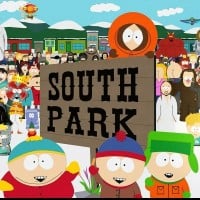 South Park is an American adult animated sitcom created by Trey Parker and Matt Stone for the Comedy Central television network. The show is about four boys, who are Stan Marsh, Kyle Broflovski, Eric Cartman, and Kenny McCormick, and their adventures in South Park, Colorado.
South Park is an American adult animated sitcom created by Trey Parker and Matt Stone for the Comedy Central television network. The show is about four boys, who are Stan Marsh, Kyle Broflovski, Eric Cartman, and Kenny McCormick, and their adventures in South Park, Colorado. There's never been a controversial cartoon quite like South Park. It looked like a cheap construction paper diorama, but what it lacked in production value it more than made up for with its raunchy humor, tons of violence and subject matter that many people consider taboo. And probably the most noteworthy running gag was Kenny getting killed in every episode save for "Mr. Hanky the Christmas Poo". As far as series creator Trey Parker and Matt Stone were concerned, there were no sacred cows in this show. Everything was fair game.
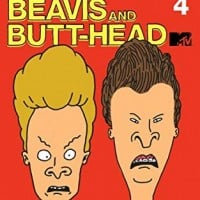
You can tell that this cartoon was going to be controversial from the first short "Frog Baseball". Even though episodes are only a few minutes long, creator Mike Judge was able to make do with what time constraints he had. They all saw the duo of anarchy get into all kinds of mischief such as riding a steamroller through the school, crashing a wedding and Beavis becoming the Great Cornholio after overdosing on caffeine more times than I dare count. It caused quite the stir that a disclaimer had to be included before each episode to deter people from trying the stunts they pull.
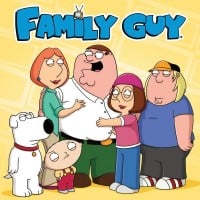 Family Guy is an American adult animated sitcom created by Seth MacFarlane for the Fox Broadcasting Company. The series centers on the Griffins, a family consisting of parents Peter (Fat, Idiotic Dad) and Lois (Nagging Bitchy Wife), their children Meg (Socially Awkward Daughter) Chris (Fat, Idiotic... read more
Family Guy is an American adult animated sitcom created by Seth MacFarlane for the Fox Broadcasting Company. The series centers on the Griffins, a family consisting of parents Peter (Fat, Idiotic Dad) and Lois (Nagging Bitchy Wife), their children Meg (Socially Awkward Daughter) Chris (Fat, Idiotic... read more When Family Guy made its debut on January 31, 1999, it was clear that this animated sitcom was a different beast than that of The Simpsons. For starters, Stewie the baby spoke with a British accent, was able to craft science fiction-esque weapons and gadgets and was constantly trying to kill Lois. There were also numerous cut-away gags such as the Ernie & Bert bit in "Mind Over Murder" that was a flashing red waring light that this show wasn't child friendly. Needless to say, the show only got more controversial from there on out.
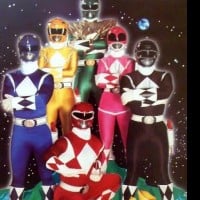 Mighty Morphin Power Rangers is an American superhero children's television series that premiered on August 28, 1993, on the Fox Kids Network.
Mighty Morphin Power Rangers is an American superhero children's television series that premiered on August 28, 1993, on the Fox Kids Network. Aired on August 28th 1993, Mighty Morphin Power Rangers used stock footage from the Japanese show Kyōryū Sentai Zyuranger as well as American footage akin to teen sitcoms such as Saved by the Bell. When the show first aired, parents felt that the show was too violent for young children. Canadian network YTV pulled the show before the first season could finish airing. There were also allegations of racial stereotyping, most noticeably Zack Taylor as the black ranger and Trini Kwan as the yellow ranger, as well as poor working conditions, low pay and hostile work environments. Yup, that was where the black magic happened to make this one of the hottest shows of the 1990s.
 The Ren & Stimpy Show, often simply referred to as Ren & Stimpy, is an American animated television series created by John Kricfalusi for Nickelodeon.
The Ren & Stimpy Show, often simply referred to as Ren & Stimpy, is an American animated television series created by John Kricfalusi for Nickelodeon. Created by John Kricfalusi and first airing on Nickelodeon, Ren and Stimpy was a dark slapstick comedy about a short-tempered Chihuahua named Ren and a dim-witted cat named Stimpy as they got into all kinds of bonkers antics. It was controversial for its violence and gross humor. Probably the show's most controversial episode was "Man's Best Friend" where the duo are adopted by a man named George Liquor. I'll let you do the research on that. In 2003, John was able to air some previously unaired episodes on Ren and Stimpy Adult Party Cartoon on MTV which just goes to show you how sometimes censorship is necessary.
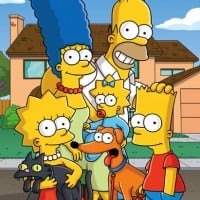 The Simpsons is an American animated sitcom created by Matt Groening that originally started on April 19, 1987 as shorts on The Tracey Ullman Show. It got its own series on December 17, 1989 and is still running as of 2023, making it the longest running animated sitcom. It is about a man named Homer... read more
The Simpsons is an American animated sitcom created by Matt Groening that originally started on April 19, 1987 as shorts on The Tracey Ullman Show. It got its own series on December 17, 1989 and is still running as of 2023, making it the longest running animated sitcom. It is about a man named Homer... read more Even though its first episode "Simpsons Roasting on an Open Fire" technically aired in the 1980s and I mean barely, The Simpsons were an iconic part of 1990s television, for better and worse. It did quite a few things that people never thought would be done in an animated show like children swearing, seeing characters naked or in some state of undress and a bunch of other mature subject matter. Nevertheless, it became one of the most watched shows of that era with some episodes like the legendary "Homer at the Bat" episode which was the first to beat "The Cosby Show" in terms of rating.
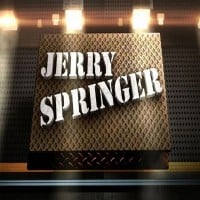 The Jerry Springer Show, also known as Jerry Springer, or just Springer, is an American syndicated tabloid talk show hosted by Jerry Springer, a former politician.
The Jerry Springer Show, also known as Jerry Springer, or just Springer, is an American syndicated tabloid talk show hosted by Jerry Springer, a former politician. There were a few talk shows in the 1990's, but none stood out the way The Jerry Springer Show did. Unlike most talk shows, guests swear like sailors, take off their clothes and fight like they're in a wrestling ring. There were even VHS tapes people could buy or rent that had no censorship at all. When "Weird Al" Yankovic's album "Running with Scissors" was released in 1999, there was a parody song based on "One Week" by "Barenaked Ladies" which accurately describes what you can expect to see on such a TV show. It was so successful it lasted until 2018.
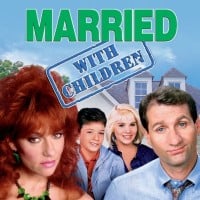 Married... with Children is an American television live-action sitcom that aired on Fox, created by Michael G. Moye and Ron Leavitt. Originally broadcast from April 5, 1987 to June 9, 1997, it is the longest-lasting live-action sitcom on Fox, and the first to be broadcast in the network's primetime... read more
Married... with Children is an American television live-action sitcom that aired on Fox, created by Michael G. Moye and Ron Leavitt. Originally broadcast from April 5, 1987 to June 9, 1997, it is the longest-lasting live-action sitcom on Fox, and the first to be broadcast in the network's primetime... read more The show that begun Fox Network's rise to power, Married with Children was not your garden variety family friendly sitcom. On the total contrary, it was quite the opposite. Even though it aired in 1987, it's raunchy and risque sense of humor helped it become popular enough to last until 1997, ten years after its debut and it seemed to get wilder every season. The sitcom revolves mostly around the misogynistic patriarch Al Bundy as he struggles to provide for his family and tries to get some respect. His wife Peg has a nasty habit of spending almost as much money as Al makes, his daughter Kelly isn't too bright, and his son Bud is the only one with any intelligence, so yeah. One of TV's most dysfunctional families. He has no qualms with insulting women and is a member of "NO MA'AM", which explains a lot. There are a few Youtube videos on Al's best comebacks, although not something you should use in real life.
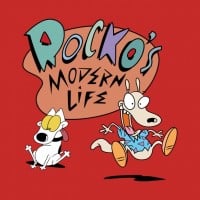 Rocko's Modern Life is an American animated television series created by Joe Murray for Nickelodeon. The series centers on the surreal life of an anthropomorphic Australian-immigrant wallaby named Rocko as well as his friends: the gluttonous steer Heffer, the neurotic turtle Filburt, and Rocko's faithful... read more
Rocko's Modern Life is an American animated television series created by Joe Murray for Nickelodeon. The series centers on the surreal life of an anthropomorphic Australian-immigrant wallaby named Rocko as well as his friends: the gluttonous steer Heffer, the neurotic turtle Filburt, and Rocko's faithful... read more This Nickelodeon cartoon may have anthropomorphic animals in it, but that doesn't necessarily mean it's for children. As Australian immigrant Rocko tries his best to adapt to American life in O'Town, there's all kinds of sexual shenanigans and adult humor. There were episodes where Rocko worked as a sex telephone operator, one where Beverly Bighead gets a little too intimate with him and another where his car dies from AIDS. There was also the episode "To Heck and Back" where Heffer has a near-death experience after choking on a chicken bone. Needless to say, the 1990s was the decade where animators were starting to become more and more bold.
 Pokémon, abbreviated from the Japanese title of Pocket Monsters and currently advertised in English as Pokémon: The Series, is a Japanese anime television series, which has been adapted for the international television markets. It was first broadcast in Japan on April 1, 1997, in the United States... read more
Pokémon, abbreviated from the Japanese title of Pocket Monsters and currently advertised in English as Pokémon: The Series, is a Japanese anime television series, which has been adapted for the international television markets. It was first broadcast in Japan on April 1, 1997, in the United States... read more Concerns over abusive use of Pokemon like chicken fighting as well as the overuse of merchandise that makes parents spend too much money. And Jynx. But all in all, it culminated in a phenomenon.
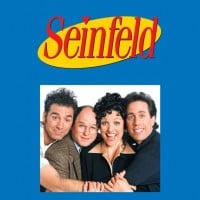 Four single friends -- comic Jerry Seinfeld, bungling George Costanza, frustrated working gal Elaine Benes and eccentric neighbor Cosmo Kramer -- deal with the absurdities of everyday life in New York City.
Four single friends -- comic Jerry Seinfeld, bungling George Costanza, frustrated working gal Elaine Benes and eccentric neighbor Cosmo Kramer -- deal with the absurdities of everyday life in New York City. One of the most controversial episode of the series is "The Puerta Rican Day" which involves Kramer accidentally burning the Puerta Rican flag during the Puerto Rican Day parade and gets attacked by a mob of people.
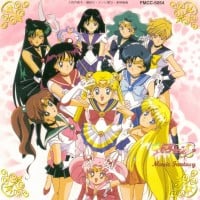 Sailor Moon is a Japanese shōjo manga series by Naoko Takeuchi. It was originally serialized in Nakayoshi from 1991 to 1997; the 52 individual chapters were published in 18 tankōbon volumes... read more
Sailor Moon is a Japanese shōjo manga series by Naoko Takeuchi. It was originally serialized in Nakayoshi from 1991 to 1997; the 52 individual chapters were published in 18 tankōbon volumes... read more What makes this beloved anime controversial is how it was something of a culture clash. The characters engaged in behavior that was normal in Japan, but heavily frowned upon in North America, like Usagi and Mamu-chan's age gap and Makoto being a 15-year old orphan living on her own. Cloverleaf kind of went overboard and tried to Americanize it as much as it could. Probably the biggest controversy surrounding the show was in season 3 where Sailor Uranus and Sailor Neptune were portrayed as cousins, which is in start contrast to their lesbian relationship in the original Japanese version. This anime goes to show that you can take the anime out of Japan, but you can't take Japan out of the anime.
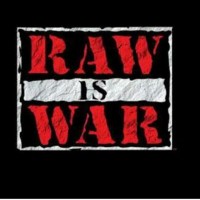
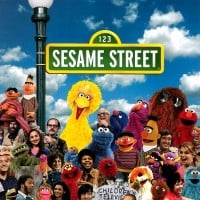 Sesame Street is a long-running American children's television series, produced by Sesame Workshop and created by Joan Ganz Cooney and Lloyd Morrisett.
Sesame Street is a long-running American children's television series, produced by Sesame Workshop and created by Joan Ganz Cooney and Lloyd Morrisett. I think it was for tackling topics your average Nickelodeon show wouldn't handle, like divorce or real-world events.
How is that show controversial in the 90s? Tell me why it's on the list.
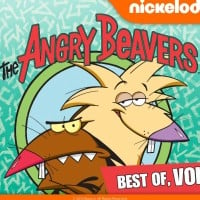 The Angry Beavers is an American animated television series created by Mitch Schauer for the Nickelodeon Channel The series revolves around Daggett and Norbert Beaver, two young beaver brothers who have left their home to become bachelors in the forest near the fictional Wayouttatown, Oregon.
The Angry Beavers is an American animated television series created by Mitch Schauer for the Nickelodeon Channel The series revolves around Daggett and Norbert Beaver, two young beaver brothers who have left their home to become bachelors in the forest near the fictional Wayouttatown, Oregon. There was one episode where one of the beavers said "SHUT UP!" but sounded more like the s word because of how it was pronounced.
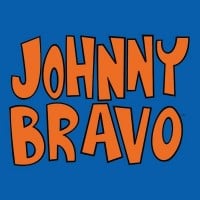 Johnny Bravo is an American animated television series created by Van Partible for Cartoon Network, and the second of the network's Cartoon Cartoons.
Johnny Bravo is an American animated television series created by Van Partible for Cartoon Network, and the second of the network's Cartoon Cartoons. A show like this probably wouldn't fly nowadays.
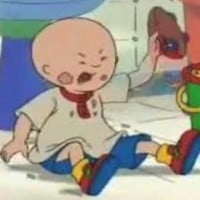 Caillou is a Canadian educational children's television series that was first shown on Teletoon (both English and French versions), with its first episode airing on the former channel on September 15, 1997; the show later moved to Treehouse TV, with its final episode being shown on that channel on October... read more
Caillou is a Canadian educational children's television series that was first shown on Teletoon (both English and French versions), with its first episode airing on the former channel on September 15, 1997; the show later moved to Treehouse TV, with its final episode being shown on that channel on October... read more Has always received criticism for teaching kids to behave like whiny little privileged brats just like the main character himself.
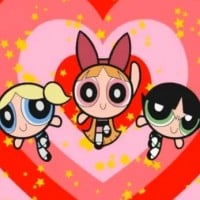 The Powerpuff Girls is an American animated television series created by animator Craig McCracken for Cartoon Network.
The Powerpuff Girls is an American animated television series created by animator Craig McCracken for Cartoon Network. Could get a bit brutal and bloody sometimes.
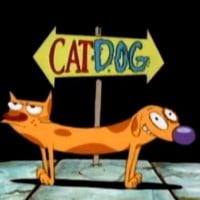 CatDog is an American animated television series created by Peter Hannan for Nickelodeon. The series depicts the life of conjoined brothers, with one half being a cat and the other a dog.
CatDog is an American animated television series created by Peter Hannan for Nickelodeon. The series depicts the life of conjoined brothers, with one half being a cat and the other a dog. Dexter's Laboratory is an American comic science fiction animated television series created by Genndy Tartakovsky for Cartoon Network, and the first of the network's Cartoon Cartoons. The show is about a kid scientist named Dexter that has a sister named Dee Dee that keeps breaking into his lab.
Dexter's Laboratory is an American comic science fiction animated television series created by Genndy Tartakovsky for Cartoon Network, and the first of the network's Cartoon Cartoons. The show is about a kid scientist named Dexter that has a sister named Dee Dee that keeps breaking into his lab. Cow and Chicken was an American animated comedy television series created by David Feiss for Cartoon Network, and the third of the network's Cartoon Cartoons.
Cow and Chicken was an American animated comedy television series created by David Feiss for Cartoon Network, and the third of the network's Cartoon Cartoons.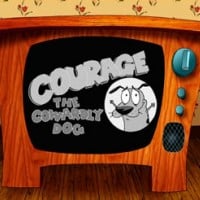 Courage the Cowardly Dog is an American animated horror comedy television series created by John R. Dilworth for Cartoon Network as part of the network's Cartoon Cartoons block.
Courage the Cowardly Dog is an American animated horror comedy television series created by John R. Dilworth for Cartoon Network as part of the network's Cartoon Cartoons block.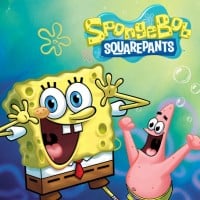 SpongeBob SquarePants is an American animated television series created by marine biologist and animator the late Stephen Hillenburg for Nickelodeon. SpongeBob is currently the most popular show on Nickelodeon, as well as the longest running show, running for 23 years, and is beginning its 13th season... read more
SpongeBob SquarePants is an American animated television series created by marine biologist and animator the late Stephen Hillenburg for Nickelodeon. SpongeBob is currently the most popular show on Nickelodeon, as well as the longest running show, running for 23 years, and is beginning its 13th season... read more